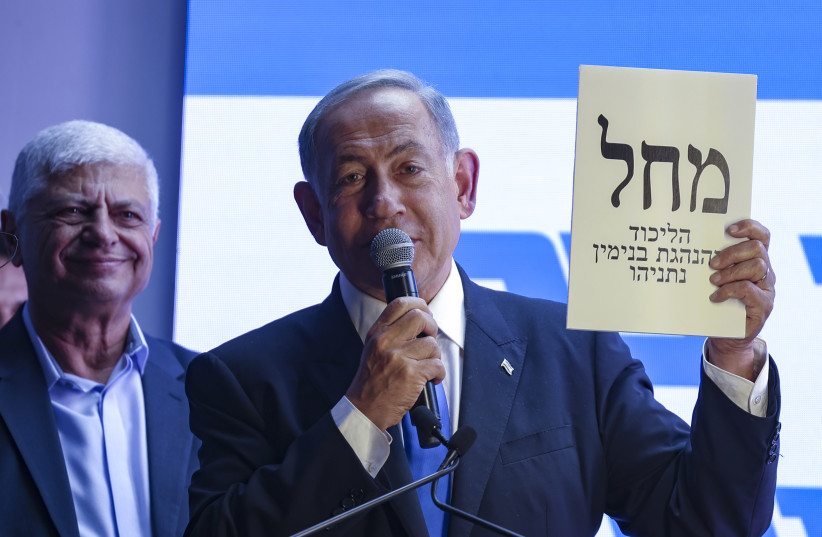NATIONAL AFFAIRS: Words are often a precursor to action. But the weary Israeli electorate is by this time drowning in words.

Consider what we had this week.
Last Friday, according to foreign reports, Israel carried out an airstrike on Damascus, the first such attack in a month. Similar attacks were reportedly carried out in Syria on Monday and Thursday as well.
On Sunday, a senior member of the Lions’ Den terrorist group was killed in what appeared to be a targeted assassination in Nablus. If Israel – which did not take responsibility – was indeed behind the blast, it would be the first targeted assassination in Judea and Samaria in more than a decade.
On Tuesday, the IDF killed five senior members of the Lions’ Den group in a bold operation in the middle of Nablus’s Casbah.
On Wednesday, President Isaac Herzog met in Washington with US President Joe Biden.
On Thursday, Defense Minister Benny Gantz met in Ankara with Turkish President Recep Tayyip Erdogan. Also on Thursday, an agreement was signed in Lebanon putting an end to the simmering, decade-old Israel-Lebanon maritime dispute.
That’s quite an eventful week, even by Israel’s dizzying news standards. Each event is significant on its own, and explanations can surely be proffered as to why these events happened precisely now. Yet, each event cannot be divorced from Tuesday’s election.

The banes of a country on an endless election treadmill
This, indeed, is one of the banes of a country on an endless election treadmill. All actions and steps in the run-up to Election Day are either affected by or perceived to be affected by, the election and how each particular step will influence the voters. No decision is seen as being taken solely on its merits, devoid of immediate electoral considerations. Everything is viewed through the prism of the election.
What this does is breed even more cynicism in this country toward the politicians and decision-makers. A healthy dose of cynicism and skepticism of motives is good. But what five election campaigns in such a short time have spawned is not a healthy dose of cynicism, but, rather, galloping cynicism. And that’s unhealthy.
In a healthy state, the public does not believe that all steps – even life-and-death decisions – are motivated by narrow political considerations that will be in the mind of the voters when they cast their ballots in an election that is always peeking just around the corner.
If the shoe were on the other foot, if Likud head Benjamin Netanyahu were in power and the IDF, for the first time in weeks, hit inside Syria, many would say that it was because of the election and his need to show the electorate that Israel is striking whenever and wherever necessary. What’s true of Netanyahu’s calculations is certainly true of Prime Minister Yair Lapid’s as well.
The same types of conjectures can be made regarding this week’s actions against the Lions’ Den. Israel has been in the midst of a mini-wave of terrorism for months. Why take the stiffest action right now?
One wants to believe that all the operational considerations – weather, intelligence, location – just came together now. But it does not stretch the imagination to believe that wanting to take crushing action against terrorism this week was meant as well to send a message to the voting public that this government – contrary to what its opponents are claiming – is tough on terror and terrorism.
Terrorism has tipped elections in this country before; tough preemptive actions are certainly designed – along with other considerations – to prevent it from happening again. None of this is to imply that such action should not be taken in the run-up to an election, but, rather, to underline how the endless elections impact heavily on daily life here.
Herzog’s meeting with Biden? On the surface, there seems nothing in that meeting that has to do with the election. Herzog is not running for office, is formally above politics, and is affiliated politically with a party that is currently polling at only five seats.
Yet still, the visit underlines the current warm state of ties between the US administration and Jerusalem. The subtext of the visit now: remember how those ties were not so warm when Netanyahu was prime minister and his interlocutor in the White House was a Democrat. There are 52 weeks in a year. Is it really a coincidence that this visit took place a week before the balloting?
There may be a domestic US consideration in holding this meeting now as well. With US midterm elections to be held on November 8, there are close Senate races in Nevada, Arizona, Georgia, Ohio, Pennsylvania, Colorado and Ohio, which could determine which party controls the Senate, and in which the Jewish vote could play an outsized role. As such, a warm meeting between the American and Israeli presidents in the Oval Office is not a bad optic for Democrats to use to target Jewish voters.
Erdogan – who has never hidden his contempt for Netanyahu – might also be trying to show Israelis how ties with Turkey have flourished under Netanyahu’s successor, though it is doubtful having Erdogan in one’s corner is much of an electoral asset with the Israeli public.
And, finally, there is the maritime border deal with Lebanon that was signed on Thursday. This is undeniably a significant deal, but again, it beggars belief that there was not an electoral consideration involved in making sure it was signed just five days before Israel votes again.
Given all that, however, Netanyahu is surely in no position to carp about the elections being an impetus for dramatic moves. He has long been the master of this art.
In March 2015 he went to Congress, frontally challenged president Barack Obama and spoke out against the Iranian nuclear deal just two weeks before an election, showing his electorate what he wanted them to see: that he is tough and more than ready to stand up to US pressure.
Two weeks before the April 2019 election, Netanyahu went to Washington, where president Donald Trump recognized Israel’s sovereignty over the Golan Heights. And then, just six days before the election, he went to Moscow where the remains of Sgt.-Maj. Zachary Baumel were returned to Israel 37 years after the soldier went missing.
A year later, before the March 2020 election, Netanyahu went to the White House, where Trump unveiled his “Deal of the Century.” On the way back he stopped off in Moscow, again just days before the election, to pick up Naama Issachar, who was imprisoned on trumped-up drug charges.
Coincidence? Sure, to the same extent that this week’s developments were coincidental. Netanyahu knows very well how to leverage the Prime Minister’s Office for his benefit before an election, to set the agenda, and to ensure what makes news. Lapid is merely taking a page out of the master’s playbook.
ISRAEL TRUDGES back to the polls on Tuesday for the fifth time in 44 months, and, tellingly, except for corona not being on anybody’s mind, much remains the same as it was last March, and much the same even as it was the first time, back in April 2019. Same people voting – though there are some 440,000 more eligible voters this time than in April 2019. Same candidates. Same defining issue: Netanyahu’s suitability to serve as prime minister.
But there were a couple of key differences this time around, most tellingly that this time, unlike the previous seven, Netanyahu did not campaign as the sitting prime minister.
Even without this boost, however, polls are showing that the Netanyahu bloc – which received only 52 seats a year and a half ago – is on a trajectory to pick up eight more seats this time, weighing in at about 60. Not enough, perhaps, to form a coalition, but a significant increase. And that was without Netanyahu being able to set the agenda.
A second major change has come over Lapid and how he has run his campaign. This time, as opposed to the previous three tries, Lapid is not trying to hide that he is running for the job of prime minister. This is why he has adopted a controversial campaign strategy of wanting to be the biggest party in his bloc, even at the risk of sucking some seats away from Meretz and Labor, which might then fall below the electoral threshold.
Why is he doing this? Because Lapid wants to be prime minister, not simply keep Netanyahu out of office and form a “sane” government – which was his overriding goal the first four tries. Now he is mincing no words; he wants to lead that government – not Gantz or anyone else – and this has affected the kind of campaign he has run.
Lapid, this time, has tried to stay above the fray, focused – statesmanlike – on matters of state. While he has had a hand in casting the race in terms of the forces of light and liberalism against those of darkness and a rollback of democracy, he did not attack Netanyahu personally as he has done previously. He did not highlight Netanyahu’s trials and legal woes.
The reason is clear: most of the country by now is well aware of why Netanyahu is on trial and has made up its mind whether he is a crook or has been railroaded. Harping on the cases will not convince those in the Netanyahu bloc to move over to Lapid’s side, but may alienate some of those former Yamina voters who are still sitting on the fence and don’t have the same degree of antipathy for Netanyahu as do others in Lapid’s camp.
In a series of television interviews Lapid gave Thursday, he spoke repeatedly of the 300,000 voters in his bloc who are debating whether to vote for him, Gantz, Meretz or Labor, and another 50,000 who are sitting on the fence between his camp and Netanyahu’s.
Those on the fence are not going to be won over by repeatedly trashing Netanyahu. They may, however, be swayed by actions Israel is taking to fight terrorism, keep Iran at bay in Syria, and improve ties with Washington and other countries – including even Turkey – around the world.
Words are often a precursor to action. But the weary Israeli electorate is by this time drowning in words. This week Lapid, in the enviable position of an incumbent able to set the agenda, sought to give them actions.
As reported by The Jerusalem Post
